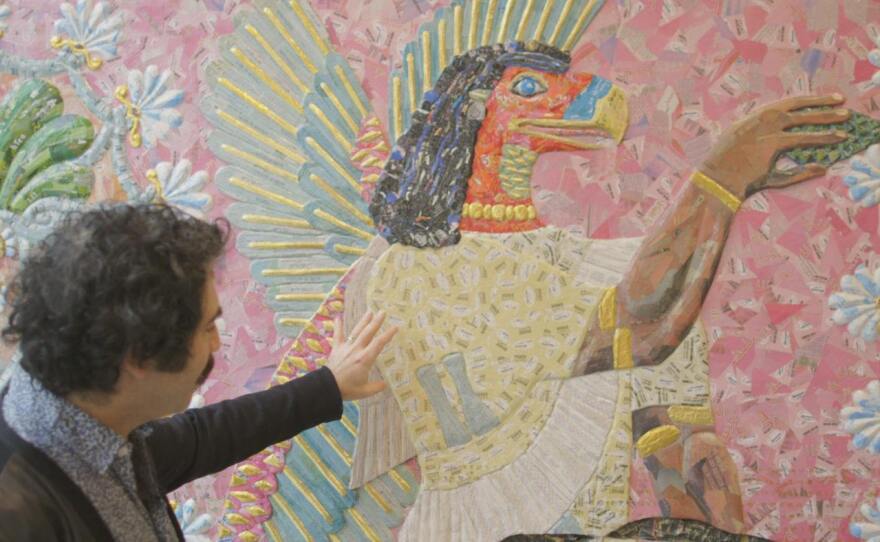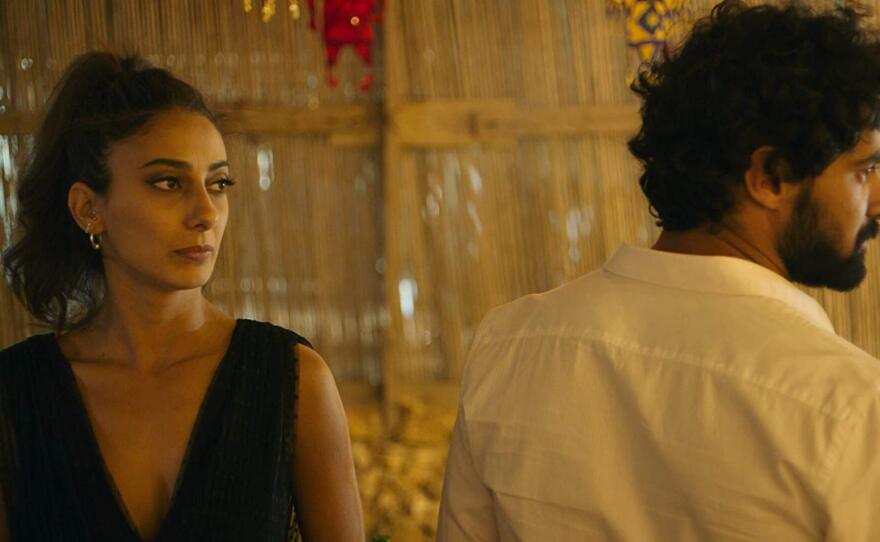The San Diego Arab Film Festival kicks off in person and online events this Saturday. It opens with Najwa Najjar's Palestinian drama "Between Heaven and Earth" at the Museum of Photographic Arts.
UPDATED, June 4, 2021
This Saturday let the San Diego Arab Film Festival put a spell on you with films from across the Arab world, from Morocco to Sudan, from Qatar to Palestine and much more.
Najwa Najjar’s “Between Heaven and Earth,” which opens the festival with an in-person event at the Museum of Photographic Arts this Saturday, bewitches with an unlikely love story about divorce. The thirtysomething couple live in the West Bank and for the first time get permission to travel to Israel to finalize the divorce. But the court insists on additional documents about the husband’s late father, a famous intellectual revolutionary. And this sends them off on a road trip of discovery.
“They rediscover themselves,” said Palestinian filmmaker Najwa Najjar, “And they discover the country as well, that they have been in many ways divorced from so it's divorce on many levels, its love under occupation. It's it's our lives in many different ways.”
Her film places a love story in the foreground with political history as the backdrop. If Najjar had been able to be at the festival in person, she would have provided an introduction for American audiences that highlighted two things.
“The first one is that this movie that was shot in 24 days,” Najjar explained. “We started in the West Bank and we shot in Jericho, Ramallah, and then we went inside the Green Line or inside of Israel, we shot in Haifa, Jaffa, Nazareth. We reached the Lebanese border where we shot in just crossing the border. And in Ikrit, where the whole story started. So this was a road movie in two separate, different conditions. In Ramallah and Jericho, we could put the camera wherever we wanted. We could put it outside the car. We didn't need permissions. We had the basic permission to do everything. And then the rest was a little bit more complicated, a little bit more difficult, which led to four arrests and led to all kinds of permissions being denied and not given.”
So in essence the story of the characters is a road movie, but so too is the story of the making of the film with the challenges of shooting reflecting the challenges Palestinians face today living in Israel and the Occupied Territories.
The second thing Najjar wants to address is more controversial and provocative, and involves the sub-story in her film that looks deep back into the area’s history.
Najjar said, “600,000 Arab Jews were brought in, mostly from Yemen, Iraq and from Morocco. And most of these people lived in these countries as Jews, just like Christians and Muslims and Jews lived together where religion was not the political issue. So these 600,000 Jews, Arab Jews that were brought into Israel between 1949 and 1952, according to Israeli statistics that have been coming out recently — 8,000 Arab Jews were kidnapped from the hospitals, the internment camps that they were placed in, where they were treated as subhuman because they are Arab. Eight thousand Arab Jews were kidnaped and given to Ashkenazi or European Jews in order for them to be raised as white. So this is quite a big story that is recently coming out in Israel where people are demanding, they're demanding to know where their children were. And this is included in my story.”
This informs Najjar's film but the Israeli government has yet to acknowledge this information as true. It has, however, begun to offer compensation to families.
This is a complex issue that merits attention outside of the small confines of a single film and beyond what I can cover in a preview of a film festival. Since information is still coming out you can look to these stories (and this is just a sampling of what's out there) from the New York Times, AP, Jewish Journal, Haaretz, and The Times of Israel for additional context and information.
The AP story contains this quote: "'This is among the most painful affairs in the history of the state of Israel,' Prime Minister Benjamin Netanyahu said. 'The time has come for the families whose infants were taken from them to receive recognition by the state and government of Israel, and financial compensation as well.'"

The festival is also showcasing the Palestinian films “200 Meters,” as the closing night film, and the Oscar-nominated short “The Present.” Rebecca Romani, who fell in love with Arab cinema while living in Morocco and has been covering the festival for years for Cinema Junkie, noted an overarching theme in these Palestinian films.
“It shows the hurdles that Palestinians encounter every day, especially those who live in the occupied territories and who need to cross into Israel. There are many things that face them, checkpoints, Israeli guards who make decisions on the spot issues of documents,” Romani said.
In the case of “200 Meters,” a film about a man who live a mere 200 meters from his wife and family but it is a distance divided by the wall between Israel and the Occupied Territories. And the process of crossing that divide becomes complicated when his son is injured in an accident.
“So in this particular film, we're seeing a very interesting situation,” Romani added. “So how he works this out is really both illuminating and somewhat terrifying because we worry, is he going to be arrested? What's going to happen to him? But again, this is part of the reality of living in the Occupied Territories and this is a beautifully shot film, very well acted, and I think it's one that you're going to enjoy for the end of the film festival.”
The festival is sponsored by Karama, which describes itself as "an independent, non-partisan organization seeking to promote understanding of the issues facing the Arab and Islamic world, and of the Palestinian issue in particular."
Larry Christian, co-chair of the San Diego Arab Film Festival and president of Karama, pointed out that Arab films have a difficult time getting distributed in the U.S.
“So they often rely on film festivals,” he said. “And that's that's part of our interest is in presenting films that are that are hard to come by and that challenge audiences.”
And that challenge is to simply open your eyes to a different perspective.
“First of all, a festival like this really provides a window onto the life and concerns and the sounds and different things like that of a region like the Arab world,” Romani said. “And when we're talking about the Arab world, we're talking about something that's really quite wide. So we have Morocco on the far edge of Africa, all the way to Egypt on the other side, and it goes up into Saudi Arabia and then it also picks up places like Sudan. So we're really talking about a very broad, diverse area, which includes a lot of different minority populations as well. So for us, it gives us a chance to learn about this group, to learn about this section of the world and also through cinema, frankly, it humanizes them for us.”

But these films do not just create empathy, they also dazzle us with artistry as with a pair of animated films from Qatar and a documentary short called “Haunting the West” by Michael Rakowitz, which looks to how artifacts from other cultures get into museums.
“He's looking at material that has been taken from Iraq and put into museums, and he's looking at it through the lens of colonization and appropriation,” Romani explained. “And in particular, he's looking at material that was looted, destroyed or broken. So what Rakowitz is doing is he's taking these particular pieces -- some of the ones which are actually missing — and he's recreating them. He is reworking their original surfaces, which include mosaics and things that were looted. But at the same time, he is giving them a new skin, the skin of a ghost, and it is a repurposed skin with coding. There is language on it such as poetry and images and reworking of color while he is investigating and pondering the idea of what happens to this material when somebody doesn't take care of it, for example, like when someone who invades and occupies a country. And what I think it is asking here, is who needs to be the caretakers of this material?”
The film is a provocative as Rakowitz describes a “museum that is also a crime palace” and reveals the layers of meaning in his his art.
All the shorts will stream online but the features will all be in-person events.
“We really feel strongly that having an in-person actual film festival is important for the community. And helps enhance the identity of the community for itself and then in relation to to the to the larger community,” Christian said.
So expand your cinematic horizons and let the San Diego Arab Film Festival cast a spell on you this Saturday through June 19.

ORIGINAL STORY
Najwa Najjar's Arab Film List
Najwa Najjar's "Pomegranates and Myrrh"
Najwa Najjar's "Eyes of a Thief"
Cherin Dabis' "Amreeka"
Elia Suleiman's "Divine Intervention"
Michael Khleifi's "Three Lost Jewels"
Annemarie Jacir's "When I Saw You"
Hani Abou Assad's "Paradise Now"
Tawfic Abdul Wael's "Atash"
Maha Haj's "Personal Affairs"
Suha Arraf's "Villa Touma"
Sameh Zoabi's "Man with a Cell Phone"
Mai Masri's "Children of Chatilla"
The U.S. news media has been focusing attention on Israel and Palestine as recent violence has erupted after years of what Americans saw as relative calm. But there has been tension in the region for decades. (For a brief overview of some of the issues check out Amnesty International and the BBC.)
For Palestinian filmmaker Najwa Najjar, many of those media images feel stereotyped and she hopes her film, "Between Heaven and Earth," can challenge those images and provide a more rounded view of Palestinians.
"I'm really happy that a film, which tackles Palestinians throughout the whole country, something that is very different than what is seen on TV, what is seen in just news clips, which is just violence, is opening the festival so that we see the real people and how real lives are at stake," Najjar said in a Zoom call from Palestine.
American filmgoers have not had many opportunities to see Palestinian films and a Palestinian perspective very often. "Paradise Now" and "Divine Intervention" are probably the two best known examples. Streaming platforms, however, are making these films more available as are events like Karama's San Diego Arab Film Festival.
RELATED: ‘There Is No Evil’ Tops List Of New Releases
For the past 10 years Karama has been hosting the Arab Film Festival and bringing a diverse array of films from across the Arab world to San Diego. Many of these films would never screen in San Diego if the festival did not showcase them, so we are fortunate to have Karama championing these amazing films.
Najjar's film has the engaging tag line describing it as a "love story about divorce." A thirtysomething couple decides to get divorced but while trying to file the final papers they hit a snag.
"Tamer, who is the son of a famous intellectual revolutionary killed in Beirut. And Salma, is a Palestinian girl from Nazareth, which is inside the 48 borders," Najjar said. "And they've been married for five years living in the West Bank. And the first time that they are given permission to enter Israel is when they're going to go and straighten out their papers in order to finalize divorce. At the court, they discover that his father had a secret, and in order finalize the divorce papers, they have to find the father's lover. And that takes them on an emotional journey throughout the country. They rediscover themselves and they discover the country as well, that they have been in many ways divorced from, so it's divorce on many levels, it's love under occupation. It's our lives in many different ways."
The festival closes with another Palestinian film, "200 Meters," which is about a man and his family who are separated by the wall that divides Israel and the Occupied Territories.
Rebecca Romani has been covering the San Diego Arab Film Festival for Cinema Junkie for the past few years. She said, "The film gives you some idea about what it's like to have to move between checkpoints in the in the territories and the hurdles Palestinians encounter everyday. I think it's important for people to be able to see the realities of the checkpoints as illustrated in these films, because most Americans have no clue whatsoever what it is to have to negotiate checkpoints for very basic needs, for medical needs, family visits, legal problems, whatever it is. These are substantial issues that occur when you live in these areas. And I think for people to see this and to see how it affects a family, gives it a certain amount of reality and an ability to relate, which I think is important for people to understand this particular situation."
This year the festival will showcase six feature films and 16 shorts, including the Oscar-nominated Palestinian film "The Present."
The San Diego Arab Film Festival launches its 10th year at the Museum of Photographic Arts this Saturday and runs online and in person through June 19.








